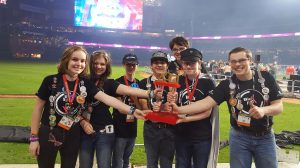
A robotics team from Pearl that won the Mississippi’s FIRST Tech Challenge robotics competition held in March at the University of Mississippi has gone on to win a world championship. The winners are, left to right, Lilli Stewart, Lauren Blacksher, Noah Gregory, Maisyn Barragan, Jordan Hariel, Logan Hariel and Mathew Blacksher. Submitted photo.
OXFORD, Miss. – A robotics team from Pearl that won the Mississippi’s FIRST Tech Challenge robotics competition in March at the University of Mississippi has gone on to win a world championship in Houston, Texas.
The group of friends from Pearl has worked together for more than five years and was part of a three-team alliance that won the FIRST Tech Challenge World Championship. Their team, called Wait For It, worked with RedNek Robotics from Sun River, Montana, and Rise of Hephaestus from San Diego to win a best of three matches at the April 19-22 competition.
The students had to pilot their robots to victory at the South Super Regional competition in Athens, Georgia, before making it to Houston for the finals. Paul Stewart, the coach and mentor for Wait For It, praised the team’s effort and determination.
“I am very proud of what the team has accomplished,” Stewart said. “Our goal this season was to simply qualify for the world championship. For this group of young professionals, winning the world championship will be something that they will remember for the rest of their lives.”
The team members, all of whom are homeschooled, are Lilli Stewart, Lauren Blacksher, Noah Gregory, Maisyn Barragan, Jordan Hariel, Logan Hariel and Mathew Blacksher.
Four other Mississippi teams placed at the championship. Techno Warriors Advanced from Brandon placed 16th, Pure Imagination from Grenada placed 63rd, both in the Jemison Division. T.R.O.N. from Flowood placed 46th and Challenge Accepted from Senatobia placed 64th in the Franklin Division.
Mannie Lowe, UM’s FIRST program manager at the university’ Center for Mathematics and Science Education, praised the winning team.
“We have seen them grow from FIRST LEGO League through the ranks of the FIRST Tech Challenge and excel both on and off the robot playing field,” Lowe said. “This team is truly an embodiment of what FIRST values in a team. Their work with their partners during the championship showed that they know how to complement any kind of team.”
“Through the generous contributions from the Robert M. Hearin Support Foundation, the Center for Mathematics and Science Education has been able to continue expanding its reach throughout Mississippi and improve mathematics and science education throughout our schools,” said John O’Haver, UM professor of chemical engineering and center director. “During 2016-17 alone, the CMSE took part in over 195 events of which 75 were hosted by the CMSE and allowed the CMSE staff to interact with over 1,000 teachers, 6,212 K-12 students and 120 college students.”
The For Inspiration and Recognition of Science and Technology, or FIRST, nonprofit organization was founded 25 years ago by inventor Dean Kaman to build interest in STEM fields.
Teams comprise up to 15 people, and any organization – not just schools – can form a team. Students are guided by teachers, coaches, mentors and community members. Teams must design and build their own robots, keep an engineer’s notebook and do some kind of outreach to promote STEM careers.
During the competition, teams of two face off against each other. This allows participants to learn how to work with other teams and enjoy healthy competition at the same time.
The robots can be built out of virtually any material as long as teams follow regulation rules. In the past, some teams have built their robots out of PVC pipe, wood and aluminum. However, the competition is about more than just robots.
Mississippi FIRST Tech Challenge teams have always proven to be high-quality robot builders, and the program will grow, Lowe said.
“We look forward to seeing bigger and better things from the team as we continue to grow the FIRST Tech Challenge program throughout the state,” Lowe said. “The program continues to grow with over 50 teams now, from four just five years ago, and we will see bigger growth in the future as others around the world now see that we have a first-class program here in the South.”